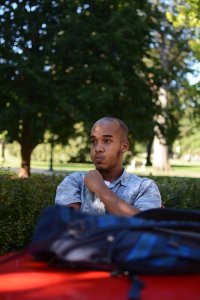He said he wanted to pray in public on the campus of his new university but he was afraid for his safety as a Muslim.
“If people look at me, a Muslim praying, I don’t know what they’re going to think, what’s going to happen,” Abdul Razak Ali Artan, the Ohio State University student responsible for Monday’s attack that injured 11 people on the campus, said in a recent interview with the school newspaper.

The August article, headlined, “Humans of Ohio State,” and interviews with a community member and a co-worker shed more light on Artan, an 18-year-old student of Somali descent.
He had just transferred from a community college, which he said had prayer rooms for Muslim students. But he didn’t know where to pray on the large Ohio State campus. He appeared frustrated at how the media portrayed his faith, and he complained to his mother about school.
On Monday, the Ohio State paper, The Lantern, republished Artan’s quotes from the article. Hours earlier, Ohio State police Officer Alan Horujko shot Artan dead within minutes of him ramming his car into pedestrians and attacking victims with a knife.
Investigators are still searching for a motive.
‘Kind of scared right now’
In the article, Artan said: “I am a Muslim, it’s not what the media portrays me to be.”
He said he didn’t blame people for the views they held about Muslims.
“It’s the media that put that picture in their heads so they’re just going to have it and it, it’s going to make them feel uncomfortable.”
He told the newspaper he was “kind of scared right now.”
“But I just did it. I relied on God. I went over to the corner and just prayed.”
The Lantern identified Artan as a third-year student in logistics management.
Before transferring to Ohio State, Artan attended Columbus State Community College starting with the 2014 autumn semester, Allen Kraus, the school’s vice-president of marketing and communications, said in an email.
Artan graduated cum laude with an Associate of Arts degree in 2016 and continued taking classes through summer semester 2016. The school had no record of behavioral or disciplinary issues during his time there, according to Kraus.
In Columbus, Artan worked a job at a Home Depot, an employee said.
The employee said Artan was “a nice, nonviolent person. He talked to everybody.”
That employee who asked not to be named, said he had seen Artan as recently as last week. Store management declined to comment. A Home Depot spokesman confirmed that Artan was currently employed by the company and had worked there for less than a year.
Immigrated from Somalia via Pakistan
A federal law enforcement official and a US official said Artan and his family came to the United States in 2014. They were in Pakistan after leaving Somalia.
David Woodyard, CEO of Catholic Charities of Dallas, told CNN that Artan and his family came to his organization in June 2014 after being vetted by the State Department. He said the family consisted of a single mom and seven children, three boys and four girls.
Catholic Charities helped the family adjust to life in the United States by helping them find a place to live in Dallas and providing assistance with language and job skills. The family decided to move after 23 days for unknown reasons, Woodyard said. Catholic Charities provided no assistance in the move.
Woodyard said there was nothing in the family’s file to indicate there had been any trouble while they were in Dallas and that he had not been able to find anyone at the organization who had a detailed memory of them.
Census figures show about 8,000 Somalians live in Ohio, giving the state the second largest Somalian population in the United States, behind Minnesota.
A community member who spoke to Artan’s family described them as a shocked by his actions. Artan’s mother said he also had lately complained about his grades, according to the community member.
Artan’s social media presence showed other complaints.
The Facebook page believed to belong to him included the grievances about attacks on Muslims, according to two federal law enforcement officials, including events in Myanmar, formerly known as Burma. Shortly before the attack, he wrote: “Seeing my fellow Muslims being tortured, raped and killed in Burma led to a boiling point,” according to federal law enforcement officials.
Muslim leaders urge public to let investigators do their job
In a news conference Monday, leaders in the local Muslim community condemned Artan’s attack.
“As Ohioans, as Americans and as Muslims, we’re shocked by today’s senseless attack,” said Roula Allouch, national board chairman of the Council on American-Islamic Relations. “We stand together with Ohioans of all faiths and backgrounds in praying for the speedy recovery of all those who were injured in today’s attack.”
Jennifer Nimer, legal director for CAIR’s Ohio chapter, urged the public not to jump to conclusions about Artan’s motive and to let investigators do their job.
“Responding to such a senseless act of violence with hate is never the solution,” Nimer said.
She added: “And we hope that Columbus will continue to be a place where people of all religions and ethnicities can be treated with respect and dignity.”
Correction: A previous version of this story incorrectly stated the number of Somalians that live in Ohio.






